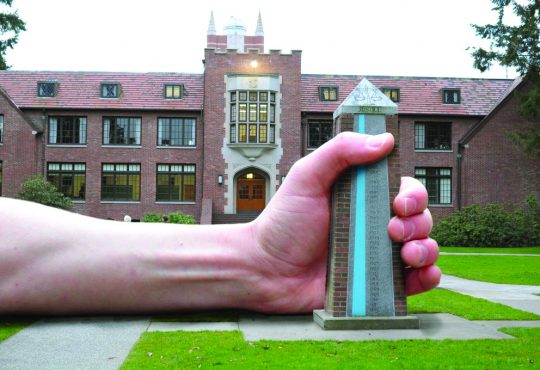
Going through their day, the average University of Puget Sound student is tremendously busy. Not only do they have four one-credit classes in one day, but also a committee meeting to attend for that event happening next week that absolutely demands the time and energy they simply don’t have, because they’ve got lab in an hour and a rehearsal after that before beginning their homework when most sane people would be tucked into bed. They have also failed, once again, to eat a real meal all day, firmly believing that coffee is a sufficient substitute.
What with all the hectic havoc of a University student’s daily life, and so much of our lives ahead of us, the admittedly limiting nature of being a parent is not a particularly enticing prospect.
Yet according to the United Nations Department of Economic and Social Affairs, the 2012 Revision of the World Population Prospects Study indicated that a quarter of the world’s women live in countries where the average age of a woman’s first childbirth is less than 20 years old.
Not only is childbirth at such a young age dangerous for both mother and child, but also, in the words of nonprofit, public interest organization Our Bodies Ourselves, “a woman who bears children at a younger age tends to have more children overall, is less able to provide for them, and is more likely to suffer ill health”.
The right to access to contraceptives is, according the U.S. Supreme Court, part of the fundamental right to privacy guaranteed by the United States Constitution, and the Supreme Court has also stated that this right extends beyond married couples to unmarried persons, including teenagers.
Yet according to studies from the International Center for Human Rights, half of the six million births occurring in the U.S. each year are unintended, and one third of women under 20 get pregnant each year. Legal obstacles the U.S. government has placed between contraceptive resources and women of color or minors prevent them from access to preventative measures, and state government enacted “Refusal Clauses” permit pharmacists and healthcare providers the right to deny contraceptives on moral or religious grounds.
Providing access to contraception not only benefits such women and their children, but also the economy. Upon examining the history of American contraception policies, University of Michigan economist Martha Bailey discovered that communities with access to birth control benefited not only in the short term but also in the long run.
Children in communities who had better access to birth control had “a 2 to 7 percent higher chance of finishing college” alongside “a 2 to 3 percent increase in family income for those kids once they became adults,” Bailey writes. While these numbers may seem arbitrary, their implications are significant blows against legal and social claims that abortion will damage society.
What this statistical difference comes down to, liberal advocacy group Think Progress explains, is the supply and demand of money and time. Families with many children have more mouths to feed, backs to clothe and heads to put under a roof, and none of these things come for free.
With a larger household to care for, paychecks coming in are stretched thinner and thinner, so that rather than a parent buying a bicycle for each of his two children at Christmas, he can’t afford more than a jump rope, a box of chalk or a coloring book for each of his eight children.
Moreover, needing more money to better support a larger family necessitates more hours at work, and having more children to care for means each child gets a little bit less of their parent’s day.
With fewer children, a parent can have more time to get more education or work experience, driving up their earning potential and thus bettering his or her family’s future, and can spend more time with each of his or her children.
Think Progress argues that “allowing parents to control family size ensures that they can invest the appropriate amount of time and money into each child that they end up having.” This means that, for most of America, it’s a question of caring well for a few or poorly for many.
If there’s anything that the average University of Puget Sound student knows, it’s that time is not limitless. After all, there’s that essay due next Tuesday, which has to be finished before the final project presentation can be prepared, and all the while, dinner has yet to be eaten. But across the Earth, there are millions of women for whom this is not a central truth of their reality, and will not become so until they must give up their fragile dreams of becoming a doctor or lawyer or librarian or captain, all in exchange for a child they did not ask for.






